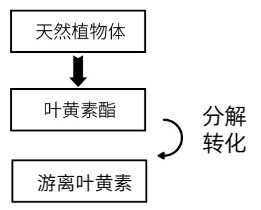Enervite Lutein

Zhen “eye” vision-protecting lutein
Are you facing the following situation?
Spending long hours scrolling, watching TV shows, staying up late and working overtime
Children often study at their desks and frequently use mobile phones
Myopia – a problem that cannot be ignored
Myopia is a common eye disease. Many people think that myopia is just a minor eye problem, but in fact, myopia has become an increasingly serious public health problem. In recent years, myopia has become prevalent in East and Southeast Asia [1]. The prevalence of myopia among young people in these areas has reached 80%-90% [2], while in Europe it is only 30%-40% [3, 4]. Not only that, the trend of myopia at younger ages is also becoming increasingly apparent. The latest national survey conducted by the Chinese government found that more than 80% of Chinese teenagers suffer from myopia [5].
Retinal Health Guardian – What is Lutein?
Lutein is one of the major carotenoids that can selectively accumulate in the eye, macula, and retina and is thought to have eye-protective effects due to its ability to quench reactive oxygen species (ROS) and absorb blue light.
The importance of lutein is recognized by the nutritional community around the world. The reason why the macula of human eyes is yellow is because it is full of lutein and its homologous series. Due to the role of lutein in filtering blue light, some people also compare lutein to “invisible sunglasses”.
However, the human body cannot synthesize lutein!
The human body lacks the enzyme required to directly synthesize lutein and cannot synthesize lutein through its own metabolic pathways. Therefore, lutein can only be supplemented from external sources. There are two types of lutein supplements currently on the market:
1. Natural lutein ester
2. Free lutein
The difference between natural lutein ester & free lutein

Natural lutein esters are widely found in plants such as marigold flowers, pumpkins and cabbage. After extracting natural lutein esters from plants, some artificial alkaline agents are added to saponify them into free lutein.
Compared with free lutein, esterified lutein is closer to the natural form of lutein and can be extracted directly from plants without any processing.
Why choose lutein esters?
1. Lutein ester has better stability【6】
A 2006 Hungarian study used an in vitro gastric acid test to test the stability of free and esterified lutein to gastric acid. The results showed that after being added to a gastric acid environment of 37 degrees Celsius for 1 hour, a large amount of free lutein was eliminated. It decreased by 66%, but the esterified lutein only decreased by 1% [6], showing that the esterified lutein has the function of protecting the lutein structure.
2.Lutein esters have higher bioavailability【7】
In 14 of 18 subjects, lutein ester supplementation resulted in greater bioavailability of lutein compared with free lutein. Overall, the lutein bioavailability of lutein ester preparations is 62% higher than that of lutein preparations [7]. Additionally, the lutein in lutein ester supplements is absorbed more quickly, resulting in higher lutein levels in the blood
3.Taking lutein ester can effectively protect your eyes
Macular pigment optical density (MPOD) is a measure of eye health risk. There is a significant positive correlation between macular pigment density and central retinal thickness. The central retinal thickness represents the overall health of the fundus. The thicker the eye, the healthier it is. Therefore, the greater the macular pigment density, the healthier the eyes.
In a one-year macular pigment study [8], two subjects consumed lutein esters. After taking the supplement for 20 to 40 days, their macular pigment optical density began to increase at an average of 1.13 ± 0.12 millimeters per day. The speed increases uniformly. Therefore, taking lutein ester can effectively protect your eyes.
Having said so much, how should we take lutein?
The higher the dose of lutein, the better. The US FDA recommends a daily intake of 6 mg of lutein, which is 12 mg of lutein ester, in small amounts and multiple times, and for long-term consumption. High doses of lutein supplements may burden the liver metabolism. It is only suitable for patients who have a family history of macular degeneration, have suffered from macular degeneration, or are highly myopic. Because the eyeballs of these patients have aged, it will be more difficult for them to absorb lutein. Taking high doses of lutein , it can reach the macula relatively quickly. Most people only need to take a normal dose of lutein, and there is no need to take a high dose of lutein.
How to take lutein ester?
In 2008, my country approved the use of lutein esters in food, with the consumption not exceeding 12mg/day. The intake of lutein is cumulative. After taking it for a period of time, although the lutein in the blood will increase significantly, the lutein concentration in our macular area will not increase immediately. Only small amounts and multiple times must be taken for a long time to achieve significant results. Increase. After taking lutein, the concentration of lutein in the blood will increase significantly in 1-2 weeks. After 3-4 months, the concentration of lutein in the macula under the eyes will become increasingly concentrated. Therefore, develop the habit of eating it every day. The most protective effect can be achieved.
Citation:
1.E. Dolgin, The myopia boom Nature, 519(7543) (2015), pp. 276-278
2.IG Morgan, et al., The epidemics of myopia: aetiology and prevention Prog. Retin. Eye Res., 62 (2018), pp. 134-149
3.S. Vitale, et al.Prevalence of refractive error in the United States, 1999-2004 Arch. Ophthalmol., 126 (8) (2008), pp. 1111-1119
4.KM Williams, et al.Increasing prevalence of myopia in Europe and the impact of education Ophthalmology, 122 (7) (2015), pp. 1489-1497
5.Jianqiang Xiao, et al. Analysis and modeling of myopia-related factors based on questionnaire survey Computers in Biology and Medicine,Volume 150,2022,106162,ISSN 0010-4825
6.Subagio A, Wakaki H, Morita N. Stability of Lutein and Its Myristate Esters. Biosci Biotechnol Biochem. 1999;63(10):1784-1786. doi:10.1271/bbb.63.1784
7.https://www.nutraceuticalsworld.com/issues/2003-05/view_peer-reviewed-research/-lutein-esters-and-free-lutein/
8.https://www.sciencedirect.com/science/article/abs/pii/S0014483597903092





